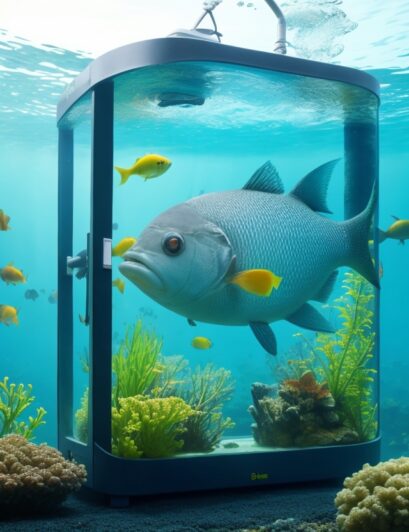Exploitation of Reservoir Fisheries in India: Reservoir fisheries play a crucial role in meeting the growing demand for fish consumption in India. These man-made bodies of water provide an important source of livelihood for many communities and contribute significantly to the economy. However, the exploitation of reservoir fisheries raises concerns about sustainability, environmental impact, and the long-term viability of these resources. This article explores the various aspects of reservoir fisheries in India, including their significance, challenges, and potential solutions.
Importance of Reservoir Fisheries in India
Reservoir fisheries play a crucial role in addressing the protein needs of a growing population in India. They contribute significantly to food security, especially in rural areas where alternative sources of protein may be limited. Additionally, reservoir fisheries provide employment opportunities, particularly for the local communities residing near these water bodies. ‘Exploitation of Reservoir Fisheries in India’
The exploitation of reservoir fisheries in India is a complex issue with a range of social, economic, and environmental implications. While these fisheries provide a vital source of food and income for millions of people, they also face a number of challenges that threaten their sustainability.
Exploitation of Reservoir Fisheries in India
India has over 90,000 reservoirs, with a total water spread area of over 4 million hectares. These reservoirs are classified into large (>5000 hectares), medium (1001 – 5000 hectares) and small (<1000 hectares) based on their size. The reservoir fisheries of India are mainly based on the culture and capture of carps, especially the Indo-Gangetic carps such as rohu, catla and mrigal. These carps are stocked in the reservoirs to enhance their productivity and yield. Other fish species such as catfish, murrels, tilapia, mahseer, prawns etc. are also found in some reservoirs. The reservoirs support a thriving fishing industry, employing an estimated 2.4 million people and generating an annual income of over Rs. 10,000 crore.
Challenges and Threats
Overfishing: One of the biggest threats to reservoir fisheries is overfishing. The use of destructive fishing gear, such as gill nets and seines, can lead to the depletion of fish stocks.
Habitat degradation: Reservoir ecosystems are often degraded by pollution, sedimentation, and invasive species. This can reduce the productivity of the fishery and make it more difficult for fish to survive. ‘Exploitation of Reservoir Fisheries in India’
Climate change: Climate change is also a major threat to reservoir fisheries. Changes in water temperature, rainfall patterns, and water levels can disrupt fish breeding cycles and alter food webs. ‘Exploitation of Reservoir Fisheries in India’
Unsustainable stocking practices: The introduction of exotic fish species for stocking purposes can have negative impacts on native fish populations.
Examples of Exploitation
Use of destructive fishing gear: The use of gill nets and seines can indiscriminately catch fish of all sizes, including juveniles, which can hinder the population’s ability to replenish itself. ‘Exploitation of Reservoir Fisheries in India’
Fishing during breeding seasons: Fishing during breeding seasons can prevent fish from reproducing, further reducing the population.
Pollution from agricultural runoff and industrial waste: Pollutants can harm fish and their food sources, making it difficult for them to survive and thrive.
Conservation Efforts
A number of efforts are underway to conserve reservoir fisheries in India. These include:
Stocking programs: Stocking reservoirs with native fish species can help to replenish fish populations that have been depleted. ‘Exploitation of Reservoir Fisheries in India’
Regulation of fishing gear and practices: Implementing regulations on the types of fishing gear that can be used and the times of year when fishing is allowed can help to protect fish stocks. ‘Exploitation of Reservoir Fisheries in India’
Habitat restoration: Restoring degraded habitats can improve the productivity of the fishery and create a more sustainable environment for fish.
Promoting sustainable aquaculture: Encouraging the development of sustainable aquaculture practices can help to reduce pressure on wild fish populations.
The Food and Agriculture Organization of the United Nations (FAO) has a number of resources on reservoir fisheries in India, including a detailed report on the status of reservoir fisheries in the country. ‘Exploitation of Reservoir Fisheries in India’
The Central Inland Fisheries Research Institute (CFRI) is a government-funded research institute that conducts research on reservoir fisheries in India.
The Network of Aquaculture Centres in Asia-Pacific (NACA) is a regional organization that works to promote sustainable aquaculture practices in Asia.
Community-Based Management Approaches
Involving local communities in the management of reservoir fisheries is crucial for their long-term sustainability. Community-based management approaches empower local stakeholders to participate in decision-making processes, develop sustainable fishing practices, and enforce regulations effectively. This collaborative approach fosters a sense of ownership and responsibility among community members, leading to improved conservation outcomes.
Role of Research and Development
Investing in research and development is essential for addressing the challenges faced by reservoir fisheries. Research institutions can conduct studies on fish biology, population dynamics, and ecosystem interactions to inform management strategies. Additionally, research can contribute to the development of sustainable aquaculture practices and the conservation of endangered fish species. ‘Exploitation of Reservoir Fisheries in India’
Promoting Responsible Fishing Practices
Promoting responsible fishing practices is crucial for ensuring the long-term viability of reservoir fisheries. This involves raising awareness among fishers about sustainable fishing techniques, promoting catch and release practices, and discouraging the use of destructive fishing methods. Education and training programs can play a vital role in promoting responsible fishing practices and building capacity among fishing communities.
Enhancing Fish Production and Productivity
Efforts should be made to enhance fish production and productivity in reservoir fisheries. This can be achieved through stocking programs, where fish fingerlings are released into reservoirs to augment fish populations. Additionally, the implementation of integrated aquaculture practices, such as polyculture and the use of nutrient-rich feed, can increase fish productivity and contribute to sustainable fish farming.
Economic Benefits and Livelihood Opportunities
Reservoir fisheries provide significant economic benefits and livelihood opportunities for communities. Along with direct employment in fishing activities, there are opportunities for fish processing, marketing, and value addition. Supporting infrastructure, such as cold storage facilities and transportation networks, can further enhance the economic potential of reservoir fisheries. ‘Exploitation of Reservoir Fisheries in India’
Awareness and Education Programs
Creating awareness and conducting education programs are essential for promoting sustainable fishing practices and raising environmental consciousness. Public campaigns, workshops, and training sessions can educate fishers and other stakeholders about the importance of conserving fish stocks, protecting the environment, and complying with fishing regulations. Such initiatives can foster a sense of responsibility towards the sustainable exploitation of reservoir fisheries. ‘Exploitation of Reservoir Fisheries in India’
International Collaboration for Knowledge Exchange
International collaboration and knowledge exchange can play a significant role in addressing the challenges faced by reservoir fisheries. Sharing experiences, best practices, and technological innovations among countries can contribute to the development of effective management strategies. Collaborative research projects and joint initiatives can facilitate the exchange of knowledge and expertise, ultimately benefiting the sustainability of reservoir fisheries worldwide. ‘Exploitation of Reservoir Fisheries in India’
Conclusion
Reservoir fisheries in India face various challenges related to overfishing, environmental impact, and governance issues. However, by adopting sustainable fishing practices, strengthening policy frameworks, involving local communities, and investing in research and development, the exploitation of reservoir fisheries can be made more sustainable. By ensuring the long-term viability of these resources, India can continue to meet the increasing demand for fish while protecting the environment and supporting the livelihoods of fishing communities. The exploitation of reservoir fisheries in India is a serious issue that needs to be addressed. By taking steps to conserve these fisheries, we can ensure that they continue to provide food, income, and livelihoods for millions of people for generations to come.
FAQs (Frequently Asked Questions)
1: What are reservoir fisheries?
Reservoir fisheries refer to the commercial fishing activities carried out in man-made reservoirs, created by damming rivers, to meet the demand for fish consumption.
2: How are reservoir fisheries managed?
Reservoir fisheries are managed through a combination of regulations, monitoring, community involvement, and technological advancements to ensure sustainable fish production and conservation.
3: What are the environmental impacts of reservoir fisheries?
Reservoir fisheries can have environmental impacts such as habitat modification, alteration of river ecosystems, and the introduction of non-native fish species, affecting the overall biodiversity of the aquatic
environment.
4: Are there any legal regulations governing reservoir fisheries?
Yes, reservoir fisheries are governed by legal regulations at national, state, and local levels to control fishing practices, protect fish stocks, and ensure sustainable exploitation of resources.
5: How can individuals contribute to the sustainability of reservoir fisheries?
Individuals can contribute to the sustainability of reservoir fisheries by practicing responsible fishing, supporting conservation efforts, and raising awareness about the importance of protecting fish stocks and the environment.






